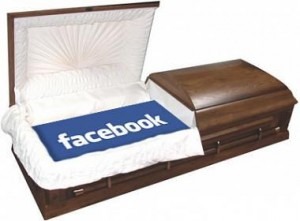So on Monday, we posted a blog about how Facebook’s IPO could be really big. Today, Lori Lewis imagines a scenario where Facebook may disappear – or at least wane in importance. Here’s an interesting viewpoint about how to make the most out of Facebook while the iron is hot. As always, we welcome your comments.
“Here’s Why Google And Facebook Might Completely Disappear In The Next Five Years.”
What a headline! It came from Eric Jackson – a Forbes.com contributor. You can read his entire article here:
To save you some time, Jackson’s theory goes like this: “With each succeeding generation in the Internet, it seems the prior generation can’t quite wrap its head around the subtle changes that the next generation brings,” noting how Web 1.0 [Google] type companies did a great job of aggregating data and presenting it in an easy to digest portal fashion but they “never really seemed to grasp the importance of Web 2.0 – building a social community.”
And now, Web 2.0 [Facebook] type companies appear to be unsure how to adapt to the new criterion – mobile. Jackson elaborates: “The failed history of Web 1.0 companies adapting to the world of social suggests that Facebook will be as woeful at adapting to mobile as Google was to social.” (Mark Zuckerberg did admit in his IPO filing earlier this year that the company is having a hard time monetizing mobile.)
 Now, I’ve never been one for predictions and especially these days. Ivan Braiker, CEO of Hipcricket, said it best at the NAB Show last month, “Everything is happening too fast to predict anything.”
Now, I’ve never been one for predictions and especially these days. Ivan Braiker, CEO of Hipcricket, said it best at the NAB Show last month, “Everything is happening too fast to predict anything.”
But if you consider the reality that the lack of adaption and evolution have disrupted so many companies in the past few years, it could lead to these questions:
What if Facebook isn’t the main platform in five years? How did you make the social giant work for you at its prime?
To get at the answers to those questions, can you answer “yes” to this group?
- Did you serve and acknowledge the fans – so much so that you were able to collect information and tap into a new league of listeners – the social mouthpieces?
- Did you strengthen the assets you own?
- Did you encourage and embrace user generated content, perhaps by creating a pool of “citizen journalists?”
- Did the company’s internal infrastructure change in order to meet the needs of the brands socially connected fans?
- Can you apply intelligence towards the continuation of building a social brand on future platforms because you studied fan behavior/expectations on Facebook?
If you can answer “yes” to those questions – your brand will be even stronger in five years.
Sadly, most brands come up short and here’s why:
“Landlord Zuckerberg’s” platform has changed consumer behavior forever. Part of it is about something that radio is not used to – fans having their own voices and their own audiences. People no longer just want to consume information – they want to participate, share, and be heard.
Zuck also offers radio the most incredible rented gateway to the spaces that broadcasters already own – the FM/AM signal, website, apps, podcasts, the stream, etc….
But Facebook is not always looked at from a strategic view. Between the NAB Show in Vegas and the Worldwide Radio Summit in Hollywood last month, there was a lot of discussion about how to “game” fans socially and secretly collect their data. And there was much too little conversation about how to serve and strengthen connections and assets authentically.
Maybe it’s just easier to be “gamey.” After all, we do see spikes – especially in PPM – when we contest so perhaps it makes sense to transfer those programming tactics onto Facebook.
But social isn’t a programming tactic. (And it’s certainly not a sales tactic.) If anything – it’s a people tactic. It’s where you build an actual conversation strategy to earn permission to be on your fans’ turf each day.
 The social sphere is where radio’s new league of listeners live – cruising Facebook, Twitter, and Pinterest and when they see their favorite brand on their preferred platform it’s like ”Cool, WXYZ is at the party, too!”
The social sphere is where radio’s new league of listeners live – cruising Facebook, Twitter, and Pinterest and when they see their favorite brand on their preferred platform it’s like ”Cool, WXYZ is at the party, too!”
However, brands have a tendency to become “that guy” at the party that tries to sell or push crap on you when everyone is just trying to have a good time. And sometimes – not with every radio station – basic fundamentals are being missed.
Too often the “party” between fans and brands start and end on Facebook with no tactics to pull people into the spaces stations actually own. And stations often come up short when it comes to tapping into the background of the uber social fans.
Look, if you believe Eric Jackson’s piece – and it’s a good article – there are still a few years left in Facebook. So maybe now is the time to ask your team, “What do we even want out of Facebook?”
Maybe it’s strengthening the assets you own. Maybe it’s tapping into your brands “Special Forces.” Maybe it’s focusing on building smaller, more nimble databases driven by motivated relationships, rather than relying solely on one large, often random database built on superficial bribes and contests.
So maybe Step One is to decide what you’re even doing socially in the first place. What is it you want to get out of it?
Is it about ratings?
Is it about revenue?
Is it about relationships?
Get it while you can.




Gary Vaynerchuk spends an hour in this video convincing an audience how to use social to build long term engagement for their businesses – by acting and behaving small. One to one, personal.
He then readily admits this whole approach to marketing on social has a shelf life of about 5 more years because “marketers ruin everything”.
Gary reminded the audience how “YOU’VE GOT MAIL” used to be a positive, exciting thing. Today, it probably means “YOU’VE GOT SPAM”
This will likely repeat with the social space as well. And we’ll all move on to what’s next.
But in the meantime – build relationships with people that support your business while they still want it.
word
video: https://soc.li/yV4e1Eh
Hi Jeff, Thank you for sharing. The social space is for serving and strengthening the relationships radio builds each day. We can no longer “cancel out the request lines” or “deal” with fans when we feel like it. It’s now about acknowledging every one who takes the time to reach out to us and buy into the notion that “every person counts.”
I appreciate your part in the conversation.